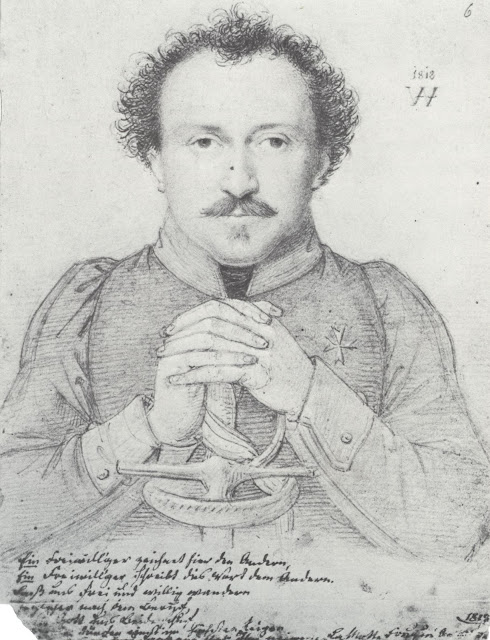Erstes Kapitel
Wie der Ritter zu dem Fischer kam
Es mögen nun wohl schon viele hundert Jahre her sein, da gab es einmal einen alten guten Fischer, der saß eines schönen Abends vor der Tür und flickte seine Netze. Er wohnte aber in einer überaus anmutigen Gegend. Der grüne Boden, worauf seine Hütte gebaut war, streckte sich weit in einen großen Landsee hinaus, und es schien ebensowohl, die Erdzunge habe sich aus Liebe zu der bläulich klaren, wunderhellen Flut in diese hineingedrängt, als auch, das Wasser habe mit verliebten Armen nach der schönen Aue gegriffen, nach ihren hochschwankenden Gräsern und Blumen und nach dem erquicklichen Schatten ihrer Bäume. Eins ging bei dem andern zu Gaste, und eben deshalb war jegliches so schön. Von Menschen freilich war an dieser hübschen Stelle wenig oder gar nichts anzutreffen, den Fischer und seine Hausleute ausgenommen. Denn hinter der Erdzunge lag ein sehr wilder Wald, den die mehrsten Leute wegen seiner Finsternis und Unwegsamkeit, wie auch wegen der wundersamen Kreaturen und Gaukeleien, die man darin antreffen sollte, allzusehr scheueten, um sich ohne Not hineinzubegeben. Der alte fromme Fischer jedoch durchschnitt ihn ohne Anfechtung zu vielen Malen, wenn er die köstlichen Fische, die er auf seiner schönen Landzunge fing, nach einer großen Stadt trug, welche nicht sehr weit hinter dem großen Walde lag. Es ward ihm wohl mehrenteils deswegen so leicht, durch den Forst zu ziehn, weil er fast keine andre als fromme Gedanken hegte und noch außerdem jedesmal, wenn er die verrufenen Schatten betrat, ein geistliches Lied aus heller Kehle und aufrichtigem Herzen anzustimmen gewohnt war.
Da er nun an diesem Abende ganz arglos bei den Netzen saß, kam ihn doch ein unversehener Schrecken an, als er es im Waldesdunkel rauschen hörte, wie Roß und Mann, und sich das Geräusch immer näher nach der Landzunge herauszog. Was er in manchen stürmigen Nächten von den Geheimnissen des Forstes geträumt hatte, zuckte ihm nun auf einmal durch den Sinn, vor allem das Bild eines riesenmäßig langen, schneeweißen Mannes, der unaufhörlich auf eine seltsame Art mit dem Kopfe nickte. Ja, als er die Augen nach dem Walde aufhob, kam es ihm ganz eigentlich vor, als sehe er durch das Laubgegitter den nickenden Mann hervorkommen. Er nahm sich aber bald zusammen, erwägend, wie ihm doch niemals in dem Walde selbsten was Bedenkliches widerfahren sei und also auf der freien Landzunge der böse Geist wohl noch minder Gewalt über ihn ausüben dürfe. Zugleich betete er recht kräftiglich einen biblischen Spruch laut aus dem Herzen heraus, wodurch ihm der kecke Mut auch zurückekam und er fast lachend sah, wie sehr er sich geirrt hatte. Der weiße, nickende Mann ward nämlich urplötzlich zu einem ihm längst wohlbekannten Bächlein, das schäumend aus dem Forste hervorrann und sich in den Landsee ergoß. Wer aber das Geräusch verursacht hatte, war ein schön geschmückter Ritter, der zu Roß durch den Baumschatten gegen die Hütte vorgeritten kam. Ein scharlachroter Mantel hing ihm über sein veilchenblaues goldgesticktes Wams herab; von dem goldfarbigen Barette wallten rote und veilchenblaue Federn, am goldnen Wehrgehenke blitzte ein ausnehmend schönes und reichverziertes Schwert. Der weiße Hengst, der den Ritter trug, war schlankeren Baues, als man es sonst bei Streitrossen zu sehen gewohnt ist, und trat so leicht über den Rasen hin, daß dieser grünbunte Teppich auch nicht die mindeste Verletzung davon zu empfangen schien. Dem alten Fischer war es noch immer nicht ganz geheuer zumut, obwohl er einzusehn meinte, daß von einer so holden Erscheinung nichts Übles zu befahren sei, weshalb er auch seinen Hut ganz sittig vor dem näherkommenden Herrn abzog und gelassen bei seinen Netzen verblieb. Da hielt der Ritter stille und fragte, ob er wohl mit seinem Pferde auf diese Nacht hier Unterkommen und Pflege finden könne? – »Was Euer Pferd betrifft, lieber Herr«, entgegnete der Fischer, »so weiß ich ihm keinen bessern Stall anzuweisen als diese beschattete Wiese und kein besseres Futter als das Gras, welches darauf wächst. Euch selbst aber will ich gerne in meinem kleinen Hause mit Abendbrot und Nachtlager bewirten, so gut es unsereiner hat.« – Der Ritter war damit ganz wohl zufrieden, er stieg von seinem Rosse, welches die beiden gemeinschaftlich losgürteten und loszügelten, und ließ es alsdann auf den blumigen Anger hinlaufen, zu seinem Wirte sprechend: »Hätt ich Euch auch minder gastlich und wohlmeinend gefunden, mein lieber alter Fischer, Ihr wäret mich dennoch wohl für heute nicht wieder losgeworden, denn, wie ich sehe, liegt vor uns ein breiter See, und mit sinkendem Abende in den wunderlichen Wald zurückzureiten, davor bewahre mich der liebe Gott!« – »Wir wollen nicht allzuviel davon reden«, sagte der Fischer und führte seinen Gast in die Hütte.














